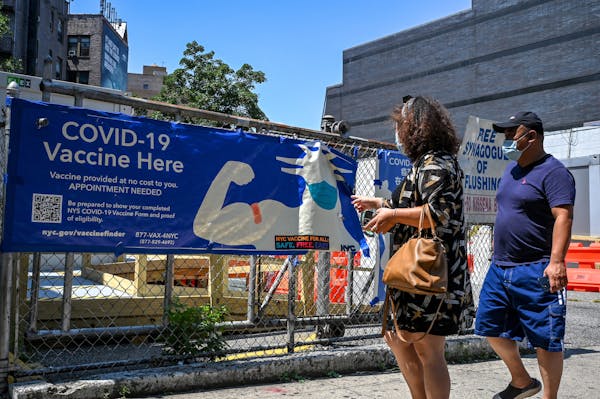State officials are urging all eligible Minnesotans — and teenagers in particular — to get their COVID-19 vaccine before school starts in the fall.
Leaders from the Minnesota Department of Health and the Department of Education on Thursday announced the state's new campaign, called "Vax to School," to promote vaccinations as a way to keep students in classrooms. They stressed that students should act now if they want to reap the full benefit of vaccination before school activities and classes begin.
"The time is now to really increase our rates of vaccinations to make sure we can protect our in-person learning and protect our students and staff," said Minnesota Health Commissioner Jan Malcolm.
Children ages 12 and older are eligible for the Pfizer vaccine, which comes in two doses given about three weeks apart. Full effectiveness comes about two weeks after the second dose. Those who are 18 and older can receive the Pfizer vaccine, the two-dose Moderna vaccine or the single-dose Johnson & Johnson vaccine.
About one-third of Minnesota's 12- to 15-year-olds are vaccinated, Malcolm said, and fewer than half of the state's 16- and 17-year-olds are.
Malcolm called that a "good start," but said it's "not nearly adequate to give the kind of protection we know is possible through vaccination."
St. Paul Public Schools' first day is Sept. 9 — about six weeks away. At the news conference, the school district's chief of staff Cedrick Baker encouraged students to seek vaccinations now, so they can be protected in time.
"Getting kids vaccinated is the best way to keep our students safe and healthy while they're at school," he said.
St. Paul schools are holding free vaccine clinics for anyone 12 and older. Locations and times for the vaccinations can be found at spps.org/covidvaccine.
Minnesota health officials announced 551 new COVID-19 cases and three more deaths Thursday, bringing the state's pandemic total to 612,001 infections and 7,663 fatalities. Minnesota's hospitals had 208 COVID-19 patients, including 57 receiving intensive care. Unvaccinated Minnesotans make up the vast majority of the state's new cases and hospitalizations, Malcolm said.
Anyone with questions about the vaccine should talk to their doctor, said Dr. Sheldon Berkowitz, the president of the Minnesota chapter of the American Academy of Pediatrics. He wants to dispel the myth that children are immune to COVID-19 or don't get severe symptoms.
As of July 15, more than 4 million cases of COVID-19 were confirmed in children in the United States, Berkowitz said. In Minnesota, more than 750,000 people under age 20 have had confirmed cases.
Children's Minnesota has admitted more than 450 child patients with COVID-19 and more than 170 of them spent time in the ICU, Berkowitz said.
Increasing vaccination rates now would mean taking advantage of a critical opportunity to limit the spread of the highly contagious delta variant of the coronavirus, Malcolm said.
"We know how disruptive COVID-19 has been and how eager folks are to get past it," she said. But, she added, the virus continues to evolve and increasing vaccination rates is a way to "stay on the offensive."
Staff writer Glenn Howatt contributed to this report.
Mara Klecker • 612-673-4440

Want to share info with the Star Tribune? How to do it securely

'Safe recovery sites' would offer syringes, naloxone and more to people using drugs. The plan could be in peril.
New Minnesota GOP leaders seek peace with party's anti-establishment wing

Who is Republican Lisa Demuth, Minnesota's first House speaker of color?

